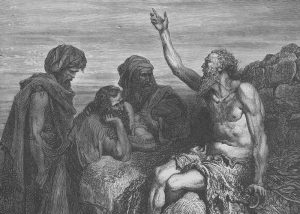
JOB CONTINUES his lament this week, openly wishing that he could hide in Sheol until God’s anger was past. In response, Eliphaz the Temanite accuses Job of guilt, asserting that God only punishes the wicked.
We know that’s true, but judgment doesn’t always happen when we want it—right now, in the physical realm, where we can see it. Furthermore, we can see with our own eyes, as Job did, that bad things happen to good people.
We also discuss a messianic prophecy, a reference to the divine council (Job 15:17—the “holy ones” are probably the Watchers; see Daniel 4:13, 17) and what may be a reference to the dolmens of the Jordan River valley (the “heaps of ruins” in Job 15:28).
Click here for the complete archive of our New Testament Bible studies to date, click here for the Old Testament studies to date, and click here for our studies of the Book of 1 Enoch to date. Or go to www.spreaker.com/show/gilbert-house-fellowship for all of the audio.

Could Job 15: 18-30 refer to the story of Cain?
Could Job 16: 9-13 refer to Jesus’s betrayal?
Sackcloth reference: Job seems to be in such long-term mourning and grief that he feels sackcloth was actually sewn into his skin and was now as much a part of him as his flesh was to his body.
Job recognizes that at death his inner spirit will go down to Sheol, while his body remains in the dust.
Have a safe trip to Oklahoma City!
If we know that any part of what Eliphaz the Temanite is false, can we believe anything he says in chapter 15? For instance, maybe God really DOES trust his holy ones and heaven is really pure? [See the NET version].
Re: which version of the Bible.
Does the New King James Version factor in documents like the Dead Sea scrolls?
Thank you.
Hi, John: Thank you for your question. Unfortunately, we don’t know that answer. We think not, but we could be wrong. We know the ESV and NET do.
That doesn’t make the NKJV a bad translation, but it does mean we should look at other resources, like commentaries and translation notes, whenever possible to get a better sense of what the verses meant when they were written.